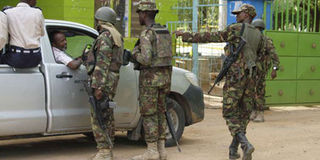College pleas for security ‘ignored’

Army officers put tight security at the entrance of Garissa University College on April 3, 2015 after Al-Shabaab terrorists attacked the University. A United Nations report says that the institute's principal sent at least five requests to senior government officials for a security boost prior to the April 2 terrorist attack. PHOTO | JEFF ANGOTE | NATION MEDIA GROUP
What you need to know:
- Al-Shabaab gunmen killed 147 people at the college in the worst terrorist attack in Kenya since the 1998 bombing of the US embassy in Nairobi that claimed 212 lives.
- The UN report cites a text message received by a senior police officer in Wajir less than 12 hours before the attack, warning that Al-Shabaab insurgents 30 kilometres from the town were poised to strike either the Garissa University College or the Garissa Teachers Training College.
NEW YORK
Garissa University College’s principal sent at least five requests to senior government officials for a security boost prior to the April 2 terrorist attack on the institution, says a United Nations report.
According to the document, released on Friday, the authorities did not heed Dr Ahmed Osman Warfa’s pleas.
Al-Shabaab gunmen killed 147 people at the college in the worst terrorist attack in Kenya since the 1998 bombing of the US embassy in Nairobi that claimed 212 lives.
The UN report cites a text message received by a senior police officer in Wajir less than 12 hours before the attack, warning that Al-Shabaab insurgents 30 kilometres from the town were poised to strike either the Garissa University College or the Garissa Teachers Training College.
“This message was not transmitted to Warfa until over a month after the fact,” says the UN Monitoring Group on Somalia and Eritrea’s report to the Security Council.
“Since Kenyan police evidently possessed the intelligence, it is unclear why it was neither acted upon, for example, by heightening the police presence in or near the university nor transmitted to the administrators of the targeted institutions,” the report adds.
“A regional security source summarised the problem when he told the monitoring group that in the Kenyan security forces, there is a ‘disconnect between the collection of intelligence and the use of intelligence.’”
NOTHING UNUSUAL
This disconnect was also a factor in the failure to prevent the Westgate Shopping Mall attack in September 2013, the monitors observe.
The police did send Dr Warfa an SMS alert in the evening of March 31, warning of a possible attack on educational institutions in the area.
However, the message advised recipients only to “be alert”, Dr Warfa told the UN team.
The principal said the text message was similar to others he regularly received.
The generic nature of the SMS received two days before the attack led him to believe the threat was not credible, or at least not out of the ordinary, says the UN report.
The first of the letters from Dr Warfa obtained by the UN experts was sent to the Garissa deputy county commissioner on December 4, 2014, four months prior to the attack.
“Following many incidences of terrorist attacks in many parts of northern Kenya, which has posed a great security threat to Garissa Town and its environs, I write to request additional six police officers to help beef up security at the campus,” Dr Warfa wrote.




